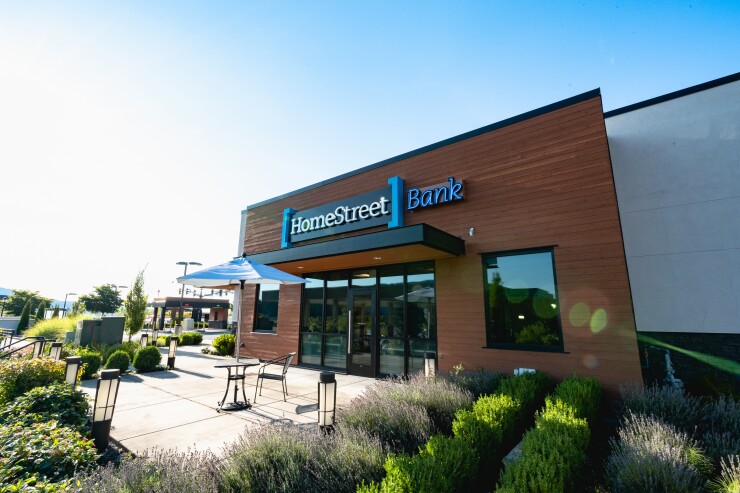
Denver-based FirstSun Capital has announced plans to switch to a Texas state charter due in part to concern the Office of the Comptroller of the Currency would delay approving its
FirstSun's subsidiary bank, Sunflower Bank, is headquartered in Dallas, making the Texas charter a natural fit, the company said this week in a press release. The company has been
"We decided this is a better long-term path for the combined organization," FirstSun CEO Neal Arnold said during a subsequent conference call with analysts. "We believe the Fed and the state of Texas have a firm understanding of our business and the nature of our [commercial real estate] risks.
"In our discussions with the OCC in Washington, it became obvious that we would not gain near-term approval given their recent experience with multifamily and CRE positions," Arnold continued. "We believe their position also resided in the fact that they were not the primary regulator for HomeStreet. The Fed is taking a very different approach, in part due to the changes we have made through the transaction."
Both Arnold and HomeStreet CEO Mark Mason, who also participated on the call, appeared to chide the OCC for failing to recognize the significantly safer risk profile of rent-controlled multifamily loans in Los Angeles compared with those in New York. HomeStreet, an active multifamily lender, does business in Southern California. HomeStreet has no exposure to New York and other East Coast markets.
"Our belief is CRE is not the same across all categories and all geographies, and it's particularly distinguished when comparing West Coast multifamily and East Coast, New York multifamily," Arnold said. "We've had a significant interaction with the state of Texas and the Fed, and we believe there's a pathway for this merger to be approved."
An OCC spokesperson had not responded to a request for comment at deadline.
Beyond adopting a Texas charter, FirstSun also said it would raise more capital than it initially planned as part of the transaction and said it would downsize the payout offered to HomeStreet shareholders. Under the plan announced Tuesday, investors would receive 0.3867 FirstSun shares for each share of HomeStreet stock, down from 0.4345 shares, an 11% reduction. The all-stock transaction was valued at $286 million when it was announced in January. The companies now expect to close the deal in the fourth quarter, later than the original estimate of mid-2024 when the transaction was announced.
FirstSun initially planned to raise $175 million in equity to support the deal. After Tuesday's announcement, the equity raise will increase to $235 million and the company will seek another $48 million in subordinated debt.
The revised exchange ratio was implemented "to partially offset some of the earnings friction created by the higher-for-longer [interest rate] impact on HomeStreet's net interest income and bottom line," Arnold said. HomeStreet agreed to sell itself after its
The $7.8 billion-asset FirstSun reported a $12.3 million first-quarter profit. HomeStreet reported a $7.5 million first-quarter operating loss Tuesday, driven by increased interest costs and a shrinking net interest margin.
Still, the company remains "very committed to this transaction," Mason said. "Our view of the attractiveness of the merger remains intact."
As part of an updated plan, the
"We've seen a more defensive posture on commercial real estate concentrations by our regulators, bank operators and investors broadly. In response to these realities, FirstSun and HomeStreet are taking some specific actions and have announced a negotiated adjustment to our merger agreement," Arnol said during the conference call.
"Uncertainty is hard for all of us," he added. "And I think we've all recognized it's become quite difficult to get mergers through some of these processes."
According to Mason, however, a sizable share of multifamily's problems are in New York, where recent changes to the city's rent-control structure combined with a weakening economy have resulted in a localized tailspin. Rent-regulated property valuations in New York City have been cut in half since 2019, according to Seth Glasser, a multifamily real estate broker at Marcus & Millichap.
Mason linked weakness in New York's multifamily market to the 2019 Housing Stability and Tenant Protection Act, which restricted city property owners' ability to increase rents and pass the cost of improvements on to residents. Critics claim the legislation is responsible for a glut of vacancies as well as a sharp decline in property values. But in Los Angeles, where no such legislation has been introduced, multifamily properties are selling at a relative premium to market-rate buildings, Mason said.
As for HomeStreet's multifamily portfolio, it remains pristine, with zero charge-offs and de minimis classified and criticized credits, Mason said. "Ours is a West Coast-based portfolio, which is significantly different from the East Coast, particularly relative to New York City," Mason said.
FirstSun's view of HomeStreet's asset quality remains positive. "There have been no revisions to our credit marks, and FirstSun and HomeStreet still have very high-quality loan portfolios," Arnold said. Indeed, the companies would have preferred to keep the $300 million in loans now earmarked for sale, "but we've decided to do this to help balance our overall loan concentration levels," Arnold added.





